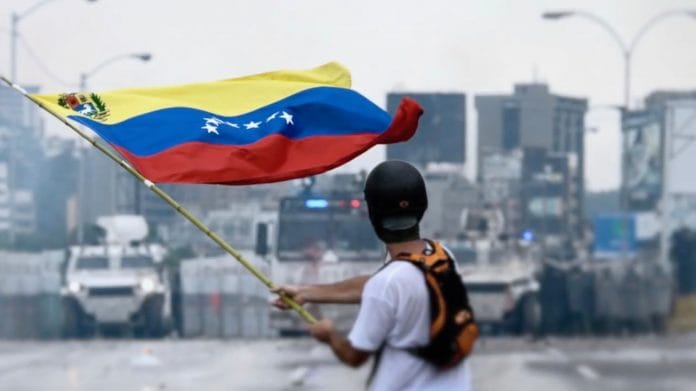Spilling into neighbouring countries
Venezuela is in the middle of terrible humanitarian crisis, and governments in Latin America are at a loss on how to respond, writes Ricardo Hausmann in Project Syndicate. Hyper-inflation in the country has spiraled into violence, with people fighting over food and other resources that can be traded as money now holds no value. There has been a mass exodus from the country, as thousands of people are traveling to Colombia to escape the hunger and crime.
“True, Venezuela’s President Nicolás Maduro is ruling unconstitutionally, relying on emergency decrees and an all-powerful, one-party, illegally established constituent assembly, while ignoring the elected National Assembly and banning opposition political parties. But the impact of his misrule is such that Venezuelans are dying from starvation, the health-care system has collapsed, and violence and contagious diseases are now practically out of control,” he writes.
Hausmann quickly outlines the present options on the table. “But none of them proposed a better solution, except to hope that United States-led individual sanctions or an oil embargo might do the trick. As the situation worsens, all will have to reconsider their options. They just cannot seem to devise a more palatable one.”
“It may be time for civil society to act. In fact, the solutions developed there may reshape responses to similar crises elsewhere.”
It now rests in society’s hands to help mitigate the crisis, he writes.
“In democratic countries, we expect justice to be the government’s responsibility. But in cases such as Venezuela, the world needs effective and inexpensive ways to dispense decentralized means of achieving deterrence. After all, are we not all our brother’s keeper?”
“Homeland” propaganda in Germany
“This week, after months of delays, Germany’s two major parties came to an agreement on the formation of a new government. For German voters it’s something of a “Back to the Future” moment, since Angela Merkel’s bloc of the Christian Democratic Union (CDU) and the Christian Social Union (CSU) is merely reprising its previous grand coalition with the Social Democrats (SPD),” writes Karen Attiah in the Washington Post.
“The plight of Germany’s traditional parties demonstrate that anxieties about immigration, integration and cultural identity are the major factors threatening to pull apart the political center in Western nations. Differences over migration policy were the biggest sticking points during the roller-coaster months of coalition talks.”
“The degree of volatility in coming to a coalition agreement is unprecedented in German politics,” she writes. This means that the mainstream is not battered and bruised, creating space for certain unfavourable ideas to re-enter it. “A small but revealing detail from this week shows how once-controversial ideas from the right are seeping into the mainstream,” she writes, referring to how the word “heimat” is now being used a lot more.
“The word for homeland, “Heimat” has a fraught history in Germany. The Nazis, who loved its connotations of folksy authenticity, regarded it as a nationalist touchstone. In the years after World War II, the word, for obvious reasons, fell out of mainstream favor. While Germans for a long time have been reluctant to use the word to refer to their national heritage, many will still use it to refer to their local roots within Germany. More recently though, the term to discuss national heritage has gained fresh currency — along with the equally controversial concept of “Leitkultur” (“leading culture”).”
“Even though the far right is still some way from achieving electoral dominance, such changes in public discourse show they are exerting considerable influence nonetheless,” she writes. The coalition’s instability shows that the far-right can still make as much of an impact without winning presidencies or parliamentary majorities.
There’s another Putin in town
Putin isn’t the only one to push any opposition out of the race to be president, writes Mona Eltahawy in the New York Times. Egyptian President Abdel Fattah el-Sisi has just pushed out five pf his most serious opponents for the elections scheduled at the end of March.
“That five presidential candidates withdrew or were forced to withdraw from running against Mr. Sisi is a reminder of the impossibility of real politics in Egypt — with “elections” mere charades blessed by a military establishment that has suffocated Egyptian politics for more than 60 years,” she writes.
“So we are caught between an American-style Sisi and an Egyptian-style Putin. Mr. Pence’s — and Mr. Tillerson’s — boss, President Trump, is emulating our military-backed dictator, Mr. Sisi, every time he unabashedly exercises greater executive powers than the Constitution allows, and Mr. Sisi in turn assures continuation for his own rule by emulating Mr. Putin’s transparently sham elections.”
“Mr. Sisi will win the March election, undoubtedly. But he has lost whatever popular support he once had. Those with access to social media in Egypt can find a litany of complaints, accusations and derision directed at him and his regime. Economic austerity, a failure to quell the insurgency in Sinai and a harsh security crackdown are to blame. And the military establishment that has so obviously shown its hand in propping him up is losing a reverence it once thought was unquestionable.”
“The military belongs in its barracks, not our ballot boxes,” she writes.







Heimat was always popular in Germany. It didn’t get unpopular after 1945. Never heard about the many “Heimat”filme of the 1950s? And Geschäftsführung remained the legal and most important term for management of GmbHs (LLC). Also the troup leaders of the Bundeswehr remained Truppenführer. They get a Führerausbildung (leader training). Because German has also the equivalent of leader – Leiter – sometimes there were differences of opinion whether a management position should be called -leiter or -führer. But it means the same.